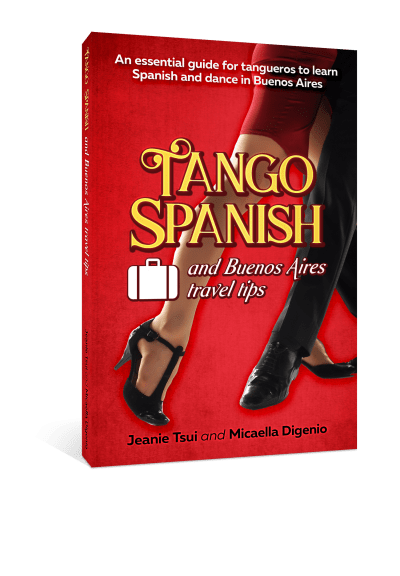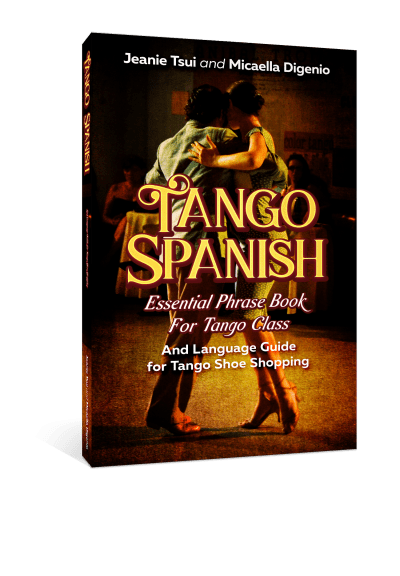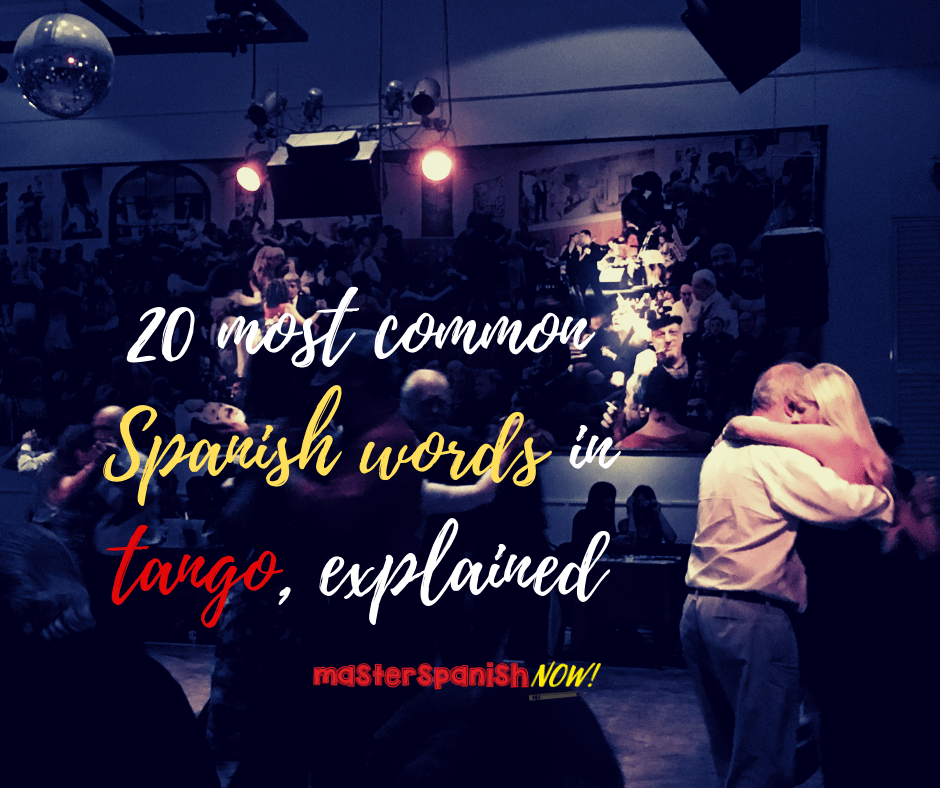For us the non-native-Spanish speaking tangueros, learning Spanish for tango seems to be a daunting task. The belief we will need to learn a ton of new vocabulary before we’d understand the lyrics is overwhelming and often holds us back from learning Spanish.
The process in fact simpler than you thought! GOOD NEWS:
You will only need to learn the 20 most common Spanish words in tango to start understanding the lyrics.
Thank to the study by Hernán J. González, who has ran an analysis of 13314 words extracted from 765 tango songs and come up with a list of most common Spanish words in tango. You can read his article here.
In this post we will explain the 20 most common Spanish words in tango, plus an example of how they form a part of the song. Given the prevalence of these Spanish words in the tango world, by learning just these 20 Spanish words in tango you’ll make a great leap in understanding tango lyrics, and get a first feeling of what the tango is about when you catch these words in the song!
Without further ado, here’s the list of the most popular Spanish words in tango and their explanation, and examples of songs that contain the word (and link to the song for you to listen):
1. Amor
Amor (love) ranks the top of the list, which shouldn’t be a surprise for us.
We can easily find the Spanish word Amor in the name and also as in the lyrics of many tangos. One example would be the song Todo es amor (It’s all love), which the lyrics, as implied by the name of the song, is all about amor:
Todo es amor,
(It’s all love,)
la brisa y tú
(the breeze and you)
jugando en el rumor,
(rejoicing in its murmur,)
y el ruiseñor
(and the nightingale)
cantando en una flor
(singing upon a flower)
buscando amor, amor…
(searching for love, love…)
2. Corazón
Corazón (heart) ranks second on the list, which perhaps again not a surprise. How can one love without a corazón?
We can find “corazón” in the song “Pocas palabras” (Few words):
Después de tanto vuelvo a hallarte
(After so long, I find you again,)
y que emoción siento al mirarte,
(I feel so much emotion as I look at you,)
siento un loco palpitar en mi viejo corazón…
(I feel my heart pounding like crazy…)
3. Vida
Tango talks about life all the time, so it’s natural that Vida (life) would rank third on the list. There is a load of tangos dealing with life which we can tell straight from their names: La vida es corta (The life is short); Cómo nos cambia la vida (How the life changes us) and some song writers even go about mirroring tango to life in songs such as La vida es una milonga (The life is a milonga).
4. Noche
Milongueros are nocturnal creatures and almost everything in tango happens at night, so noche (night) is another Spanish keyword you must know for tango.
“Esta noche de luna” (This moonlit night) is a beautiful song that describes a romantic moonlit night for a couple:
…Y en los abismos
(And in the abysses)
De esta noche de luna
(of this moonlit night,)
Sólo quiero vivir
(I only want to live,)
De rodillas a tus pies
(On my of knees at your feet)
Para amarte y morir…
(To love you and to die.)
5. Alma
Alma (Soul) is another big Spanish word in tango. How can you feel all the emotion in tango without a alma?
Desde el alma (From the soul) is a beautiful val encouraging a broken soul to put things in the past and move on.
Alma, si tanto te han herido
(Soul, if they have hurt you so much)
¿Por qué te niegas al olvido?
(Why do you refuse to forget?)
¿Por qué prefieres
(Why do you prefer)
llorar lo que has perdido….
(to cry for what you’ve lost…)
…Vives inútilmente triste
(You live needlessly sad)
y sé que nunca mereciste
(and I know that you never deserved)
pagar con penas
(to redeem with sorrow)
la culpa de ser buena
(the blame of being good,)
tan buena como fuiste, por amor.
(as good as you were, for love.)
6. Dolor
Tango has known to be melancholic, and we have songs talk about all kind of dolor (pain): pain of separation; pain of betrayal; pain of lost…
One song in which we can find the word “dolor” is the song “Cantando” (Singing):
…Cantando yo le di, mi corazón, mi amor,
(…Singing I gave him, my heart, my love)
Y desde que se fue, yo canto mi dolor,
(and since he has left, I sing my sorrows)
Cantando lo encontré, cantando lo perdí,
(singing I found him, singing I lost him,)
Porque no sé llorar, cantando he de morir…
(because I don´t know how to cry, singing I will die…)
7. Ojos
Ojos (Eyes) play a big part in tango, all the dancing in milongas would not happen without the exchange of glances between the males and females.
Praising the dazzling eyes of a woman is a common flattery trick of Argentine men, and legend has it that Francisco Canaro went all the way to write “ Yo no se que me han hecho tus ojos” (I don’t know what your eyes have done to me) as a love song for Ada Falcón, a tango singer of his orchestra who is famous for her beautiful large green eyes.
…Yo no se que me han hecho tus ojos
(…I do not know what your eyes have done to me)
que al mirarme me matan de amor,
(that their looks kill me with love,)
yo no se que me han hecho tus labios
(I do not know what your lips have done to me)
que al besar mis labios, se olvida el dolor.
(that in kissing my lips, the banish pain…)
8. Triste
Most tango are sad, so there’s no surprise we can always find the word Triste (sad) in the songs.
In the tango “Lejos de Buenos Aires” (Far from Buenos Aires) the lyricist laments for his nostalgia of Buenos Aires:
Con la mueca de pesar
(With a grimace of grief)
Viejo, triste y sin valor,
(old, sad and worthless)
Lento el paso al caminar,
(slowing down my step as I walk,)
Voy cargando mi dolor,
(I am carrying my pain)
Lejos de la gran ciudad
(Far from the great city,)
Que me ha visto florecer.
(That witnessed my flourishing.)
En las calles más extrañas,
(In these strange streets,)
Siento el alma oscurecer.
(I feel the darkening of my soul.)
9. Día
The Spanish word Día means “day”. You can find the word in “Indiferencia” (Indifference)
Yo también, como todos, un día
(I also, like all others, once in the past,)
Tenía dinero, amigos y hogar
(I had money, friends and a home,)
Nunca supe que había falsía
(I had never known that there was falsity,)
Que el mundo sabía también traicionar.
(That the world also knew how to betray.)
10. Querio
“Querio” (I like; I want) is the first person form of “querer” (like; want), it also forms a part of the most killing romantic expression in this world—“Te quiero” (I love you)!
It’s also a word that you’d use a lot for asking for something, for example:
Querio un vaso de aqua.
(I’d like a glass of water)
You can find the Spanish word querio in the tango “Cantando”:
Si es pecado querer tanto en esta vida,
(If it is a sin to love so much in this life,)
Yo te pido, de rodillas, tu perdón
(I am asking you, on my knees, for your forgiveness)
Yo lo quiero tanto y tanto que me muero,
(I love him so much, but so much that I would die,)
Si me faltan las caricias de su amor.
(If I don’t have the caresses of his love.)
11. Voz
Voz means voice, and you can find the Spanish word voz in the tango “Cristal”:
…Tus sueños y mi voz, y nuestra timidez,
(Your dreams and my voice, and our shyness,)
Temblando suavemente en tu balcón,
(Shaking softly at your balcony,)
Y ahora sólo se, que todo se perdió,
(And only now I know, that all was lost,)
La tarde de mi ausencia.
(The afternoon that I left…)
12. Viejo
The Spanish word viejo functions as an adjective meaning “old” (the feminine form would be “vieja”). It’s also often used as a noun referring to “an old man”, or “father” (The female form is again vieja).
We can find the word “viejo” in the lyrics of “Lejos de Buenos Aires”
Con la mueca del pesar,
(With a grimace of grief,)
Viejo, triste y sin valor,
(Old, sad and worthless…)
13. Pobre
Tango originated in the grassroot society of Buenos Aires so there should be no surprise many songs would mention about the life of the pobres (poors). Pobre can also be use an adjective form of poor, but watch out for the difference in the meanings when we place “pobre” before or after the noun it modifies:
Una familia pobre
(A poor family (without sufficient financial resources))
Un pobre familia
(A miserable family)
You can find the Spanish word pobre in the song “Alma en pena” (Soul in sorrow):
…Esa voz que vuelvo a oír, un día fue mía,
(That voice that I hear again, one day it was mine,)
Y hoy de ella es apenas, el eco el que alumbra,
(and now it’s just her echo that shines,)
Mi pobre alma en pena, que cae moribunda,
(my poor soul in sorrow, that falls dying,)
El pie de su balcón.
(at the foot of her balcony.)
14. Pena
Tango is full of pena (sorrow, pity) and regret.
You can find the word in the song’s title Alma en pena (Soul in sorrow):
Alma…que en pena vas errando,
(Soul…, that you wander in sorrow)
Acércate a su puerta, suplícale llorando,
(get close to her door, plead with her whilst crying,)
Oye…perdona si te pido,
(listen…forgive if I ask you,)
Mendrugos del olvido, que alegre te hace ser.
(scraps of oblivion, that makes you happy…)
15. Tango
There should be no surprise that “Tango” is one of the most common words in the tango lyrics!
Claudio Frollo, a prominent lawyer and judge of the Buenos Aires high courts, who was also a milonguero (tango dancer who frequent milongas), wrote the lyrics for “Danza Maligna” (Wicked dance, a song that glorifies tango, naming the orchestras as the altars and the bandoneon as the priest:
…Placer de dioses, baile perverso,
(Pleasure of the gods, this perverse dance,)
El tango, es rito y es religión,
(The tango, is a ritual and is a religion,)
Orquestas criollas son sus altares,
(The native orchestras are the altars,)
Y el sacerdote, su bandoneón
(And the priest, is the bandoneon…)
16. Tengo
Tengo (I have) is the first person present form of “Tener” (to have), and one example of tango that contains the Spanish word “tengo” is Fueron tres años (Three years have passed):
…Aún tengo fuego en los labios,
(I still have fire in my lips,)
Del beso de despedida
(from the goodbye kiss,)
¿Cómo pensar que mentías,
(How could I think that you were lying,)
Si tus negros ojos lloraban por mí?
(If your dark eyes were crying for me?)
17. Querer
“Querer” (to wish/ to want/ to like) is the infinitive verb form of “quiero” (I like/ I want ) (#10 most common Spanish word in tango).
You can easily find the Spanish word in many tangos, usually in the form of other variations of the verb form.
One example would be in “Lejos de Buenos Aires” (Far from Buenos Aires):
Nadie observa mi final,
(No one notices my ending,)
Ni le importa mi dolor,
(Nor cares about my pain,)
Nadie quiere mi amistad,
(Nobody wants my friendship,)
Sólo estoy con mi amargor.
(I am just alone with my bitterness.)
Here quiere is the third person form of “querer” in present tense.
18. Llorar & 19. Recuerdo
“Llorar” means cry, and “recuerdo” means memory.
You can find the both words in “Lejos de Buenos Aires”
¡Tango que trae recuerdos!
(Tango that brings back memories!)
¡Mi Buenos Aires, quiero llorar!
(My Buenos Aires, I want to cry!)
20. Ayer
Tango always talks about memory and things happen in the past, so it’s no surprise that ayer (yesterday) often forms part of the lyrics.
You can find the word “ayer” in the all time classic tango by D’Arienzo “Paciencia” (Patience):
…Ni vos sos la misma, no yo soy el mismo
(Neither you are the same, nor I am the same)
Los años…la vida…quién sabe lo qué.
(the years…the life…who can tell what.)
De una vez por todos, mejor la franqueza,
(Once and for all, it’s better to be honest,)
Yo y vos, no podemos volver al ayer.
(me and you, we can not return to the past.)
Enjoyed reading this blog post. Learn these 20 most common Spanish words in tango and make a great leap in understanding tango songs!
Want to learn Spanish for tango? You can book a 30-minute trial class for only USD7 with our Tango Spanish teachers who are tangueras living in Buenos Aires!
Most of the tango lyrics and translation are adapted from “Tango words: Letras de tango. A Guide to Tango lyrics with English Translation” by Manuel Garber. You can find the book here.
Check out our books Tango Spanish and Buenos Aires Travel Tips and Tango Spanish: Essential Phrase Book For Tango Class (And Language Guide for Tango Shoe Shopping).



